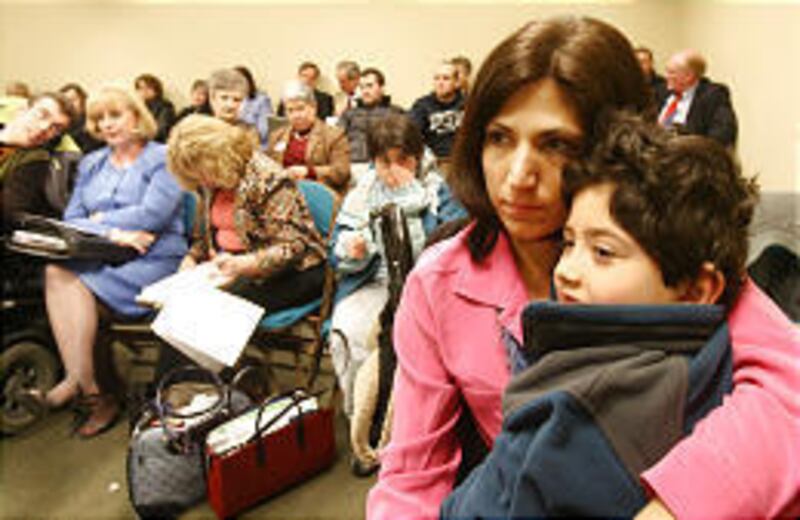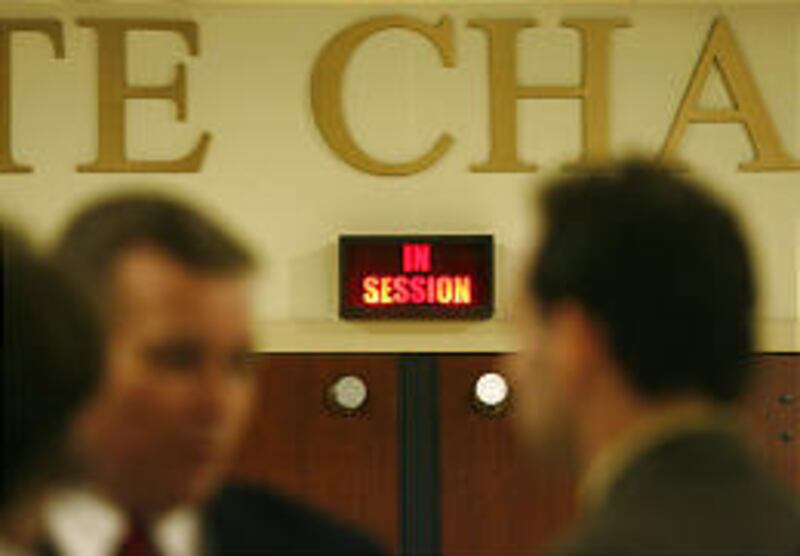Money. Public education funding. Tax cuts. And more money.
That is what the 2007 Legislature will likely be known for — a record spending plan that took care of major programs and special pork projects alike.
Lawmakers and Gov. Jon Huntsman Jr. rushed to close the 45-day session at midnight Wednesday — with the majority Republicans praising all the spending in an $11 billion new budget while minority Democrats said a number of critical programs still fall short of what could have been done.
"This is a year of new records, in public education funding, in meaningful tax reform, and all done free of rancor," Huntsman told news reporters three hours before adjournment.
Noting the nearly $2 billion in new money, the governor said: "We've taken care of needs that have languished in the past."
Other than not funding the waiting list for disabled Utahns, there really were no other disappointments, he said.
And Huntsman doesn't necessarily see the need for a special session for repairs in tax policy, although there usually is a special session each year as things arise, he said.
A number of controversial bills "just fizzled" before they grew to the level of mischief, Huntsman said. He now has 20 days to veto bills, sign them into law or let them become law without his signature.
Utah's 104 part-time lawmakers wrapped up their last general session in the cramped, temporary quarters in an office building behind the state Capitol building.
Come the 2008 Legislature, lawmakers and Huntsman will be in the newly remodeled (costing more than $200 million) Capitol.
"No, I won't miss" the temporary quarters, said a relaxed House Speaker Greg Curtis, R-Sandy, Wednesday night.
Curtis praised Republican and Democratic lawmakers alike, saying "we elevated the discussion this year. And I was amazed that the (tax cut/tax reform bill) passed unanimously."
The $220 million in tax cuts won't come for 10 months, Curtis said apologetically, but he added that was required because of the complexity of all the tax reductions and tax reform.
The imposing Capitol building reflects power and money — both of which were seen on the Hill over the last seven weeks.
Between one-time surpluses this year and tax revenue growth over the next fiscal year, lawmakers had an extra $1.75 billion to spend.
After much wrangling they settled on a $220 million tax cut — the bill passing the last day.
However, all those tax cuts don't come until Jan. 1, 2008. (All of the House, half of the Senate and Huntsman face re-election in 2008, so the timing isn't so bad politically.)
With the tax cuts comes a new, 5 percent single-rate personal income tax system, cuts in the general and food sales taxes and reductions in half a dozen other taxes.
The spending plan for fiscal 2008, which starts this July 1, is also a record — around $11 billion (depending on how it is counted).
GOP lawmakers — tired of being painted as anti-public education, anti-teacher — specifically wrote the public education funding bill to include $2,500 base-pay raises for all teachers with a one-time bonus of $1,000 each, with more than $440 million in new money going to public education.
"We were treated very well," said state Superintendent of Public Education Patti Harrington. "We still have some work to do to get to the average Western level" of teacher pay. Utah is around $30,000 for a starting teacher, Colorado at $35,000 and Nevada at $38,000.
"We got all day kindergarten," funded, she added. "We're pleased with that." Huntsman listed that as one his main goals of this session.
Higher education got a bunch of money, too, and Utah Valley State College will become Utah Valley University — getting $10 million to fund the upgrade.
But even with so much spending, legislators still increased drivers' licenses by $5, specialty motor licenses by $2. The $2.8 million the raises bring will go toward staffing new DMV offices.
And some special hunting and fishing licenses will also go up, while a few others will go down. The additional money will help local state fish hatcheries with fish production so streams and lakes can be better stocked.
Legislators also took care of a number of high-profile issues with more tact and good humor than in recent sessions.
Early in the session, by one vote, the House passed the long-debated private school voucher bill. The Senate quickly followed suit and Huntsman signed it into law.
The bill will let parents who send their children to private schools in the future to qualify for up to a $2,500 tuition voucher. And late Wednesday legislators slipped in an additional $3 million to pay for vouchers.
The $12 million for the new program comes not out of education funds but out of general tax dollars — so opponents couldn't claim that public education funding was being harmed.
A bitter battle over abortion was avoided when a bill outlawing most abortions (clearly unconstitutional) was amended to outlaw most of the procedures should the U.S. Supreme Court overrule Roe v. Wade. Huntsman said he'll probably sign that bill.
Attorney General Mark Shurtleff said it would cost between $2 million and $8 million to defend the coming lawsuit, and GOP leaders decided to let someone else pay the cost of challenging the 1973 abortion-rights ruling.
When Salt Lake County Mayor Peter Corroon refused to endorse a special tax diversion to help Real Salt Lake soccer team, in stepped Huntsman and Curtis.
Using county tax dollars, the governor engineered the purchase of Sandy land for the new soccer stadium and pushed the building of a large parking structure — both required to keep the professional soccer league in Utah.
After years of arguments, lawmakers tried to accommodate several minority groups.
Legislators twice voted down attempts to take away from illegal immigrants in-state college tuition. And Wednesday the House finalized a constitutional change that will start the 45-day session the day after the Martin Luther King Jr. holiday, instead of starting on the holiday.
As in recent years, legislators refused to adopt half a dozen so-called government reform bills.
Killed were bills that would have banned lobbyist gifts to legislators, restrict lawmakers' campaign account spending on personal items, adopt a bipartisan commission to recommend legislative and congressional redistricting, stop legislators from becoming lobbyists immediately upon leaving public office and limit campaign contributions to the governor and other state offices to $10,000.
Huntsman said in future Legislatures he'll try to term-limit governors to eight years and cap large campaign contributions.
Legislators did adopt a bill that, while not lowering the $50 gift limit whereby lobbyists list accepting lawmakers by name, does require government officials who lobby legislators to file reports and required quarterly financial reporting by lobbyists among a few other changes.
And EnergySolutions, a hazardous and radioactive materials storage firm in the West Desert, got legislators and Huntsman to exempt lawmakers and governors from approving its current on-site storage regulations.
EnergySolutions gave hundreds of thousands of dollars to lawmakers' re-election campaigns and to Huntsman's PACs over the past several years.
With all the extra cash, legislators decided to pour hundreds of millions of dollars into roads.
A late addition of $90 million will seed a $1 billion bond to begin work on all kinds of transportation projects and to buy land for new major roads, like the Mountain View Corridor on Salt Lake County's west side.
But even with the extra billions of dollars in spending, some longtime sore points were not addressed, Democrats said.
For example, the waiting list for disabled Utahns was not fully funded, meaning some of the state's most needy citizens will still have to wait for their needs to be met.
The last night of each session, lawmakers pass a bill that funds "special" projects ranked by the dueling party caucuses.
Because there was so much extra cash this year, on the last day GOP leaders decided to increase that spending from $2 million ($1 million per house) to $6 million ($3 million per house). The leaders themselves picked the $4 million items from previously considered lists, although the rank-and-file approved the bills.
Some of the items making the late "pork" list included: $20,000 for the Dyers woad weed collection project; $25,000 for the Antelope Island Balloon Festival; $300,000 to buy more land for the Cedar City Shakespearean Festival; $300,000 for "restaurant promotion"; $14,000 for Art In a Box; and $800,000 for the Utah Festival Opera in Logan (which happens to be the home of Senate budget chairman Sen. Lyle Hillyard).
Finally, some political needs were aided as well.
Next Feb. 5, $3.5 million will be spent to hold a statewide presidential primary election. It's hoped that a number of presidential candidates — including Republicans Mitt Romney and John McCain, both who have either come here or plan to visit — will come to Utah during the big 2008 presidential election year.
E-mail: bbjri@desnews.com


